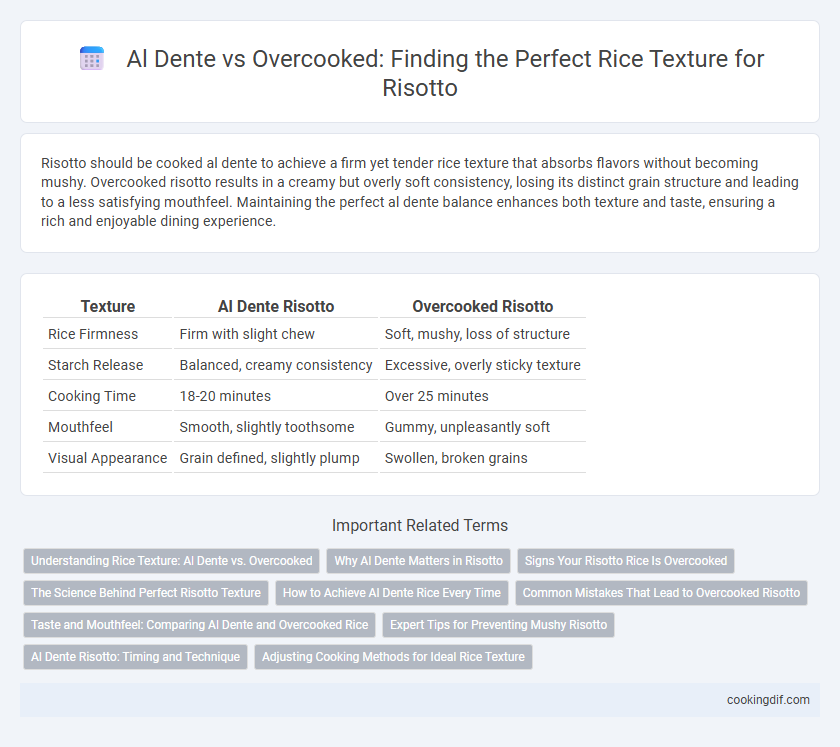Risotto should be cooked al dente to achieve a firm yet tender rice texture that absorbs flavors without becoming mushy. Overcooked risotto results in a creamy but overly soft consistency, losing its distinct grain structure and leading to a less satisfying mouthfeel. Maintaining the perfect al dente balance enhances both texture and taste, ensuring a rich and enjoyable dining experience.
Table of Comparison
| Texture | Al Dente Risotto | Overcooked Risotto |
|---|---|---|
| Rice Firmness | Firm with slight chew | Soft, mushy, loss of structure |
| Starch Release | Balanced, creamy consistency | Excessive, overly sticky texture |
| Cooking Time | 18-20 minutes | Over 25 minutes |
| Mouthfeel | Smooth, slightly toothsome | Gummy, unpleasantly soft |
| Visual Appearance | Grain defined, slightly plump | Swollen, broken grains |
Understanding Rice Texture: Al Dente vs. Overcooked
Al dente risotto rice retains a firm yet tender core, providing a subtle chewiness that enhances the dish's texture and allows the grains to remain distinct without becoming mushy. Overcooked risotto results in rice grains that lose their shape and firmness, creating a sticky, gluey consistency that diminishes the intended creamy balance. Achieving the perfect al dente texture depends on careful timing and constant stirring to release starch while preserving the integrity of varieties like Arborio, Carnaroli, or Vialone Nano.
Why Al Dente Matters in Risotto
Al dente texture in risotto ensures each grain of Arborio rice remains firm yet tender, providing the perfect balance between creaminess and bite, essential for authentic risotto. Overcooked rice results in a mushy consistency, losing the distinct individual grain texture that defines this classic Italian dish. Maintaining al dente rice enhances the risotto's ability to absorb flavors and release starch gradually, creating its signature creamy and luxurious mouthfeel.
Signs Your Risotto Rice Is Overcooked
Overcooked risotto rice loses its characteristic firmness and becomes mushy, signaling that the grains have absorbed too much liquid. Signs your risotto rice is overcooked include a sticky, clumpy texture and a lack of distinct grain separation. Maintaining an al dente texture ensures the rice grains remain tender yet firm, providing the ideal creamy consistency essential for authentic risotto.
The Science Behind Perfect Risotto Texture
The science behind perfect risotto texture hinges on achieving al dente rice, where each grain remains firm yet tender, allowing optimal starch release that creates the creamy consistency risotto is known for. Overcooked rice loses this structural integrity, becoming mushy and reducing the dish's desirable bite and texture contrast. Proper absorption of hot broth while stirring continuously ensures even cooking and a balance between creaminess and al dente firmness.
How to Achieve Al Dente Rice Every Time
Achieving al dente rice in risotto requires precise timing and constant stirring to release the starch evenly, ensuring a creamy yet firm texture. Using high-quality Arborio or Carnaroli rice varieties enhances the ability to maintain the perfect bite without becoming mushy. Monitoring the liquid absorption closely and removing the risotto from heat just before the rice is fully cooked prevents overcooking and preserves the desired al dente consistency.
Common Mistakes That Lead to Overcooked Risotto
Many home cooks mistakenly rely on excessive stirring and prolonged cooking time, which breaks down the rice grains and results in a mushy risotto instead of the desired al dente texture. Using too much liquid or adding it all at once prevents proper absorption, causing the rice to become overcooked and lose its firmness. Choosing short-grain varieties like Arborio or Carnaroli and carefully monitoring cooking time helps achieve the perfect balance between creamy consistency and a slightly firm bite.
Taste and Mouthfeel: Comparing Al Dente and Overcooked Rice
Al dente risotto rice offers a firm texture that delivers a satisfying bite and releases subtle nutty flavors, enhancing the overall taste experience. Overcooked rice becomes mushy and loses its individual grain integrity, resulting in a bland, sticky mouthfeel that diminishes the dish's complexity. Maintaining the perfect al dente balance preserves the creamy consistency of risotto while providing a pleasant contrast between softness and chewiness.
Expert Tips for Preventing Mushy Risotto
Achieving the perfect al dente texture in risotto requires precise timing and constant stirring to ensure each grain of Arborio rice remains tender yet firm. Expert chefs recommend gradually adding warm broth and tasting frequently to avoid overcooking, which leads to mushy, clumpy rice. Using high-quality, starchy rice varieties and maintaining medium heat helps retain the ideal creamy consistency without sacrificing texture.
Al Dente Risotto: Timing and Technique
Achieving al dente risotto requires precise timing and continuous stirring to release the rice's natural starch while maintaining a firm center. Overcooked risotto results in a mushy texture that lacks the desired bite and compromises the delicate creaminess. Using Arborio or Carnaroli rice varieties with consistent heat ensures optimal absorption and the perfect al dente consistency.
Adjusting Cooking Methods for Ideal Rice Texture
Achieving al dente rice in risotto requires careful timing and constant stirring to release just enough starch for a creamy consistency without turning mushy. Overcooked risotto results from excessive liquid absorption and prolonged cooking, leading to a soft, sticky texture that diminishes the dish's characteristic bite. Adjust cooking methods by gradually adding warm broth and frequently tasting the rice to ensure it remains firm to the tooth while fully cooked.
al dente vs overcooked for rice texture Infographic

 cookingdif.com
cookingdif.com